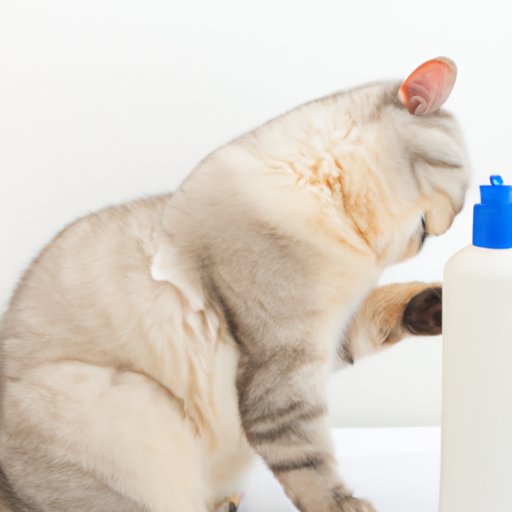Introduction
Itchy skin, also known as pruritus, is a common issue that cats face. It can be caused by a variety of factors, including allergies, parasites, bacterial infections, fungal infections, and underlying medical conditions. In order to effectively soothe your cat’s itchy skin, it is important to take a holistic approach that includes proper grooming, a healthy diet, and treatments recommended by your veterinarian.
Bathing Your Cat Regularly
Regular baths are an important part of keeping your cat’s skin healthy and free from itchiness. However, it is important to use the right type of shampoo. According to Dr. Jennifer Coates, DVM, “Cats with itchy skin should be bathed with a hypoallergenic, soap-free shampoo.” This type of shampoo helps to prevent further irritation while also moisturizing the skin.
How often you should bathe your cat depends on their individual needs. If your cat has itchy skin due to allergies, they may need to be bathed more frequently. However, if their skin is only occasionally itchy, once every two weeks should suffice. Be sure to talk to your veterinarian about the frequency of bathing that is best for your cat.
Use an Anti-Itch Spray or Cream
An anti-itch spray or cream can provide relief from itching caused by allergies or other skin irritations. When choosing a product, look for one that contains natural ingredients such as aloe vera, chamomile, or oatmeal. These ingredients help to soothe and moisturize the skin.
When applying the spray or cream, make sure to avoid the eyes, nose, and mouth. Gently massage the product into the affected areas until it is fully absorbed. You can apply the product up to three times daily, but be sure to talk to your veterinarian first to ensure that it is safe to do so.
Keeping Your Cat’s Fur Clean
Proper grooming is essential for keeping your cat’s coat and skin healthy. Brushing and combing your cat regularly helps to remove dirt, debris, and allergens that can cause itching. Additionally, brushing prevents mats and tangles that can lead to discomfort and skin irritation.
If your cat does develop mats or tangles, it is important to address them quickly. Use a wide-toothed comb to gently work out the knots. You can also use a detangling spray to make the process easier. If the matting is severe, you may need to have it professionally removed.
Check for Fleas and Mites
Fleas and mites are common causes of itchy skin in cats. Signs of these parasites include excessive scratching, licking, and biting at the skin. You may also see small black dots on the skin or in your cat’s fur. If you suspect that your cat has fleas or mites, take them to the vet for diagnosis and treatment.
Treatment options vary depending on the type of parasite. Your veterinarian may recommend topical medications, oral medications, or medicated baths. Be sure to follow their instructions carefully in order to effectively eliminate the parasites and relieve your cat’s itchy skin.
Feed a High-Quality Diet
A healthy, balanced diet is important for overall good health, including skin health. Make sure that your cat is getting all of the nutrients they need to boost their immune system. Foods that are rich in omega-3 fatty acids, such as salmon and mackerel, can help to reduce inflammation and promote healthy skin.
In addition to fresh foods, look for high-quality canned food and kibble that are specifically formulated for cats. Avoid foods that contain artificial colors, flavors, and preservatives, as these can cause allergic reactions and skin irritation.
Visit the Vet
If your cat’s itchy skin does not improve with home remedies, it is important to take them to the vet for a checkup. Your veterinarian will be able to rule out any underlying medical conditions that may be causing the itching. They may also recommend additional treatments, such as antibiotics, steroids, or allergy shots.
Conclusion
Itchy skin can be uncomfortable and even painful for cats. To soothe your cat’s itchy skin, it is important to take a holistic approach that includes proper grooming, a healthy diet, and treatments recommended by your veterinarian. With the right care, you can help keep your cat comfortable and itch-free.
(Note: Is this article not meeting your expectations? Do you have knowledge or insights to share? Unlock new opportunities and expand your reach by joining our authors team. Click Registration to join us and share your expertise with our readers.)
